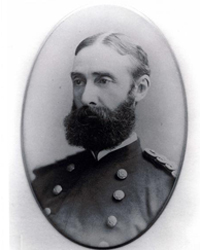Lieutenant Colonel
Francis H. Parker
 Lt. Col.
Francis Henry Parker served through the Civil War, commanded nine arsenals and depots, served on numerous
Ordnance boards, and wrote several important reports on various aspects of weapons manufacturing.
Lt. Col.
Francis Henry Parker served through the Civil War, commanded nine arsenals and depots, served on numerous
Ordnance boards, and wrote several important reports on various aspects of weapons manufacturing.
Parker graduated 20th in a class of 35 from West Point in June 1861. Parker immediately reported with most of his class for duty at Washington, D.C. upon the outbreak of the Civil War.
Parker had been commissioned in the Dragoons, and saw his first action at the Battle of First Manassas on 21 July 1861. In October 1861, Parker was transferred from the Dragoons to the Ordnance Department, serving as Assistant Ordnance Officer at the Washington [D.C.] Arsenal. In January 1862 he was back in the field, serving in MG George McClellan's Army of the Potomac.
Parker stayed with the Army of the Potomac through the Battle of Antietam. Following the battle, Parker was responsible for shifting the ammunition train to Frederick, Maryland, and establishing a depot there.
He next served as Assistant Ordnance Officer at the St. Louis Arsenal, Missouri, from October 1862 to July 1863. He was then off to field service once again, as Chief of Ordnance for the Army of the Tennessee. He was present for the Battle of Chattanooga.
Parker returned to arsenal duty in February 1864 as Assistant Ordnance Officer at Watervliet Arsenal, New York. In July 1864 Parker assumed command of the Cincinnati Ordnance Depot. Again he returned to the field in December 1864 to serve as Chief Ordnance Officer, Army of the Potomac.
Parker took charge of the Army's Ordnance depot at City Point, Virginia. He served as the Army of the Potomac's Chief Ordnance Officer through war's end in April 1865.
In July 1865 Parker reported to Watertown Arsenal, Massachusetts, to serve as Assistant Ordnance Officer, but after only about ten weeks there was sent to take command of the Charleston Arsenal in South Carolina and to serve as Chief Ordnance Officer of the Second Military District, comprising North and South Carolina. Parker commanded Charleston Arsenal for three years.
Parker left Charleston in 1868 to serve as Assistant Ordnance Officer at the Rock Island Arsenal, Illinois. In 1869 then assumed command of the Dearbornville Arsenal in Michigan. In 1871 Parker assumed duties as Assistant Ordnance Officer at the Washington Arsenal in the District of Columbia. In 1873 Parker was assigned to the Fort Monroe Arsenal in Virginia as Assistant Ordnance Officer. He was promoted to major in 1875 and took command of the Fort Monroe Arsenal in 1876. In addition to his duties at the arsenal, Parker served on various Ordnance boards, a common duty for Ordnance officers, especially as they grew in seniority and experience.
Parker established an office in New York City and worked to build a new depot, designated the Picatinny Powder Depot, and was its first commander, serving until 1883, when he assumed command of the Watertown Arsenal in Massachusetts. In 1889 he was ordered to take command of Watervliet Arsenal. This heavy workload took an increasing toll on Parker's health, and he suffered frequent and severe attacks of various respiratory ailments.
In September 1896, he took a month's leave of absence to stay at a sanatorium in western New York. The doctor there recorded that Parker suffered from chronic pneumonia and tuberculosis. He returned to the arsenal but remained gravely ill and died there on 22 February 1897.
Increasingly debilitating illness and death cut short the career of an Ordnance officer who was undoubtedly heading for even greater things given his important assignments in establishing the Picatinny Powder Depot, his work in manufacturing and testing the latest artillery, and his success in bringing the new gun factory on line at Watervliet Arsenal. Despite his untimely death, Lt. Col. Francis H. Parker's accomplishments in 35 years of service in peace and war are still impressive and matched by few other Ordnance officers.